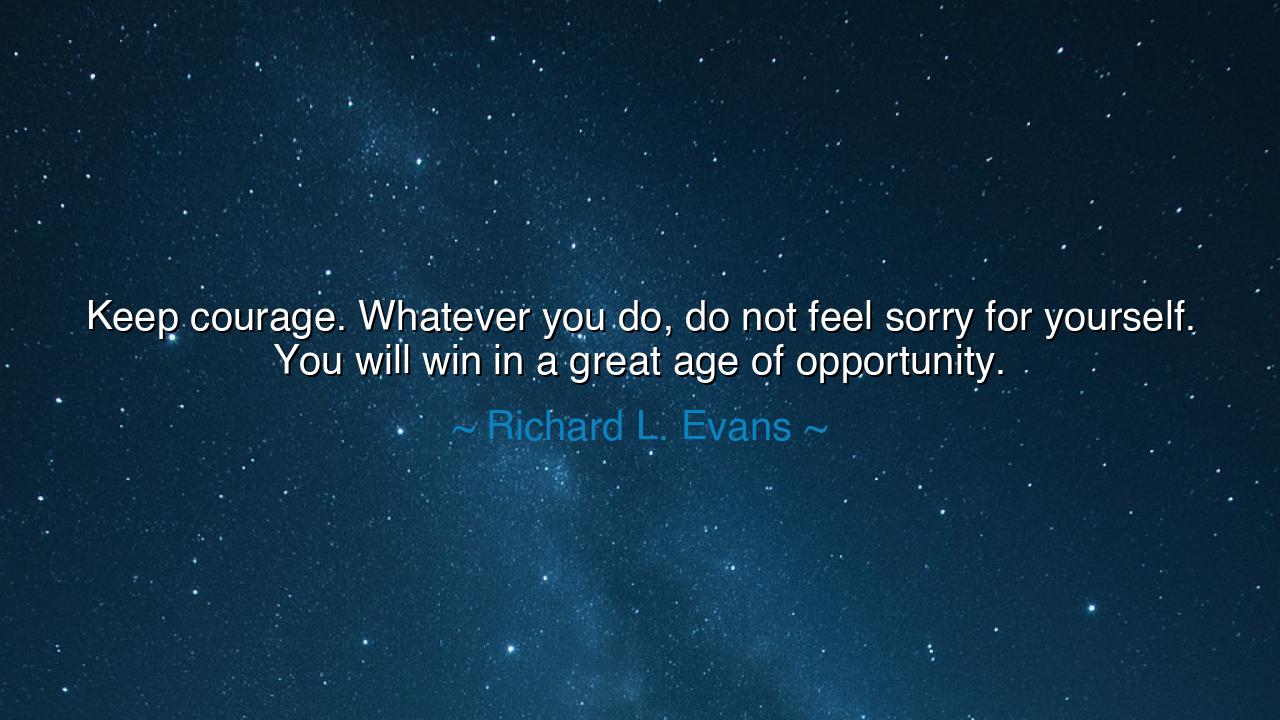
Keep courage. Whatever you do, do not feel sorry for yourself.
Keep courage. Whatever you do, do not feel sorry for yourself. You will win in a great age of opportunity.






In the words of Richard L. Evans, “Keep courage. Whatever you do, do not feel sorry for yourself. You will win in a great age of opportunity,” we hear the voice of timeless encouragement — a call not just to hope, but to endurance. These words, though gentle in tone, carry the strength of iron. Evans, known for his moral reflections and quiet eloquence, here reminds us that self-pity is the thief of progress, and that courage, steady and unbroken, is the key that unlocks every age of possibility. To “keep courage” is to guard the flame of the soul when winds of adversity blow, and to believe that even in struggle, one’s destiny still bends toward victory.
The origin of this quote is found in the mid-twentieth century, when Evans spoke often on radio and in print, offering words of wisdom for lives marked by uncertainty, war, and renewal. His message was not bound to his time, but eternal — for every age, even ours, faces its trials and temptations to despair. His phrase “a great age of opportunity” does not describe a world free from hardship, but one in which hardship itself becomes the field of greatness. The “greatness” he speaks of lies not in comfort, but in the courage to keep walking when the road grows dark, and to refuse the poison of self-pity when defeat whispers that all is lost.
For the ancients, such courage was not mere boldness, but moral strength — the inner discipline to stand firm when storms rage. The Stoics called it fortitudo: the power to accept what is and to act with integrity regardless of circumstance. In this, Evans echoes the same truth: that no person can rise to victory if they are chained by resentment or self-pity. To feel sorry for oneself is to turn inward and surrender the will. But to keep courage is to turn outward — toward duty, toward gratitude, toward the unending possibility of renewal.
Consider the story of Helen Keller, who, though struck blind and deaf in childhood, refused to yield to despair. She once said, “Although the world is full of suffering, it is full also of the overcoming of it.” In her darkness, she found not self-pity, but purpose. She learned to speak, to write, to inspire millions across the world — not because her life was easy, but because she chose courage over complaint. Her triumph was not of circumstance but of spirit. She lived, as Evans said, in a “great age of opportunity,” made great not by its comfort, but by the power of the human will to rise within it.
Evans’s wisdom also carries a warning for all who live in times of change. When the world offers new doors to open — through progress, invention, or freedom — it also tests the hearts of men and women. Those who cling to fear and bitterness are left behind; those who act with courage and self-belief become the builders of the new age. The age of opportunity belongs not to the entitled, but to the brave — to those who persevere when others surrender, to those who see in every difficulty the seed of achievement.
To “not feel sorry for yourself” is more than advice; it is a discipline of the soul. It means refusing to be ruled by disappointment, choosing instead to turn pain into wisdom. The one who pities himself is defeated twice — first by hardship, then by despair. But the one who holds fast to courage turns even sorrow into strength. Every trial can become a teacher; every failure, a forge. Thus, the wise understand that life does not reward the comfortable, but the courageous.
Let this, then, be the lesson of Evans’s words: that no matter your struggle, you must never cast your heart into self-pity, for that is the beginning of defeat. Instead, lift your eyes to the horizon of opportunity, knowing that history favors the steadfast. Act bravely. Work honestly. Endure faithfully. When fear tempts you to stop, remember that all who have ever achieved greatness began by keeping courage through long seasons of uncertainty.
So, to you who labor and hope, remember this ancient truth reborn through Evans’s modern voice: you will win — not by luck or ease, but by perseverance. The world belongs not to those who complain of its storms, but to those who walk through them, unbowed, hearts alight with purpose. Keep courage, and the age of opportunity will be yours.






AAdministratorAdministrator
Welcome, honored guests. Please leave a comment, we will respond soon